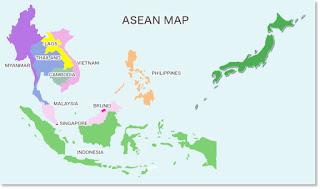GIP Event: The Future of Southeast Asia
This past Monday, the Global Initiatives Program hosted an event to learn about the future of Southeast Asia.
 In the first half of the evening, there was a panel including two consuls from Southeast Asian countries and one American businessman who works in Southeast Asia. I was very interested in the responses of the diplomats in particular. The moderator asked a variety of broad questions (such as "what is the current state of democracy in Southeast Asia?"), to which the consuls had somewhat vague answers. While I did learn about some of the ongoing issues in Southeast Asia, such as the ASEAN alliance, working together, and responsibility for ocean pollution, I learned even more about diplomatic relations. The two consuls answered questions in ways that obviously reflected their countries' agendas. It was fascinating to hear about an issue from an American businessman who had no stake in the audience's impression and then hear the consuls' responses. I heard no admittance of weakness in a country's policy, even when the businessman was able to highlight them. The consul from Indonesia even brought t-shirts as prizes, and he succeeded in that being my lasting impression of him. The diplomacy really shrouded the content of this section of the evening, but I learned a lot nonetheless.
In the first half of the evening, there was a panel including two consuls from Southeast Asian countries and one American businessman who works in Southeast Asia. I was very interested in the responses of the diplomats in particular. The moderator asked a variety of broad questions (such as "what is the current state of democracy in Southeast Asia?"), to which the consuls had somewhat vague answers. While I did learn about some of the ongoing issues in Southeast Asia, such as the ASEAN alliance, working together, and responsibility for ocean pollution, I learned even more about diplomatic relations. The two consuls answered questions in ways that obviously reflected their countries' agendas. It was fascinating to hear about an issue from an American businessman who had no stake in the audience's impression and then hear the consuls' responses. I heard no admittance of weakness in a country's policy, even when the businessman was able to highlight them. The consul from Indonesia even brought t-shirts as prizes, and he succeeded in that being my lasting impression of him. The diplomacy really shrouded the content of this section of the evening, but I learned a lot nonetheless.
Then, there was a second panel consisting of author Reza Aslan and professor George Dutton. These two highly qualified speakers taught me about enormous issues that get little to no attention in Western media. Their main focus was the Rohingya crisis, of which I had been completely unaware. The Rohingya people, who are an ethnic minority group in Myanmar, have been the victims of a genocide for their practice of Islam. Although Myanmar seems a world away, the speakers did an excellent job of connecting the Rohingya crisis to their audience. They first spoke of the issue of arbitrary borders drawn by British imperialists, which we can connect to numerous areas in the world. They also focused on the issue of religious nationalism. The speakers argued that Buddism, in particular, becomes very tied to nationalism, which leads to the association of a nation-state to one religion exclusively and potential conflict. This has played out in the issues of Myanmar with the full-scale genocide of the Rohingya, but the speakers also argued it can be applied to the U.S. We too have a group of religious nationalists that have created animosity within our country. While it is not on the same scale, we must take action before it escalates. The speakers concluded that the issues of a nation-state come back to these questions: How do you define yourself? What do you have to have in common to be considered a nation? If you do have transnational loyalty, how do you respond to people of other nationalities, religions, and beliefs? I don't have some answer to the ever-polarizing American society, but this new knowledge of the Rohingya crisis has provided me with a new perspective through which to look at it.
While I expected to learn about the outside world, I was met with an opportunity for introspection on America. Thank you to the organizers for their planning and the speakers for their expertise!
 In the first half of the evening, there was a panel including two consuls from Southeast Asian countries and one American businessman who works in Southeast Asia. I was very interested in the responses of the diplomats in particular. The moderator asked a variety of broad questions (such as "what is the current state of democracy in Southeast Asia?"), to which the consuls had somewhat vague answers. While I did learn about some of the ongoing issues in Southeast Asia, such as the ASEAN alliance, working together, and responsibility for ocean pollution, I learned even more about diplomatic relations. The two consuls answered questions in ways that obviously reflected their countries' agendas. It was fascinating to hear about an issue from an American businessman who had no stake in the audience's impression and then hear the consuls' responses. I heard no admittance of weakness in a country's policy, even when the businessman was able to highlight them. The consul from Indonesia even brought t-shirts as prizes, and he succeeded in that being my lasting impression of him. The diplomacy really shrouded the content of this section of the evening, but I learned a lot nonetheless.
In the first half of the evening, there was a panel including two consuls from Southeast Asian countries and one American businessman who works in Southeast Asia. I was very interested in the responses of the diplomats in particular. The moderator asked a variety of broad questions (such as "what is the current state of democracy in Southeast Asia?"), to which the consuls had somewhat vague answers. While I did learn about some of the ongoing issues in Southeast Asia, such as the ASEAN alliance, working together, and responsibility for ocean pollution, I learned even more about diplomatic relations. The two consuls answered questions in ways that obviously reflected their countries' agendas. It was fascinating to hear about an issue from an American businessman who had no stake in the audience's impression and then hear the consuls' responses. I heard no admittance of weakness in a country's policy, even when the businessman was able to highlight them. The consul from Indonesia even brought t-shirts as prizes, and he succeeded in that being my lasting impression of him. The diplomacy really shrouded the content of this section of the evening, but I learned a lot nonetheless. |
| Myanmar |
While I expected to learn about the outside world, I was met with an opportunity for introspection on America. Thank you to the organizers for their planning and the speakers for their expertise!

Comments
Post a Comment